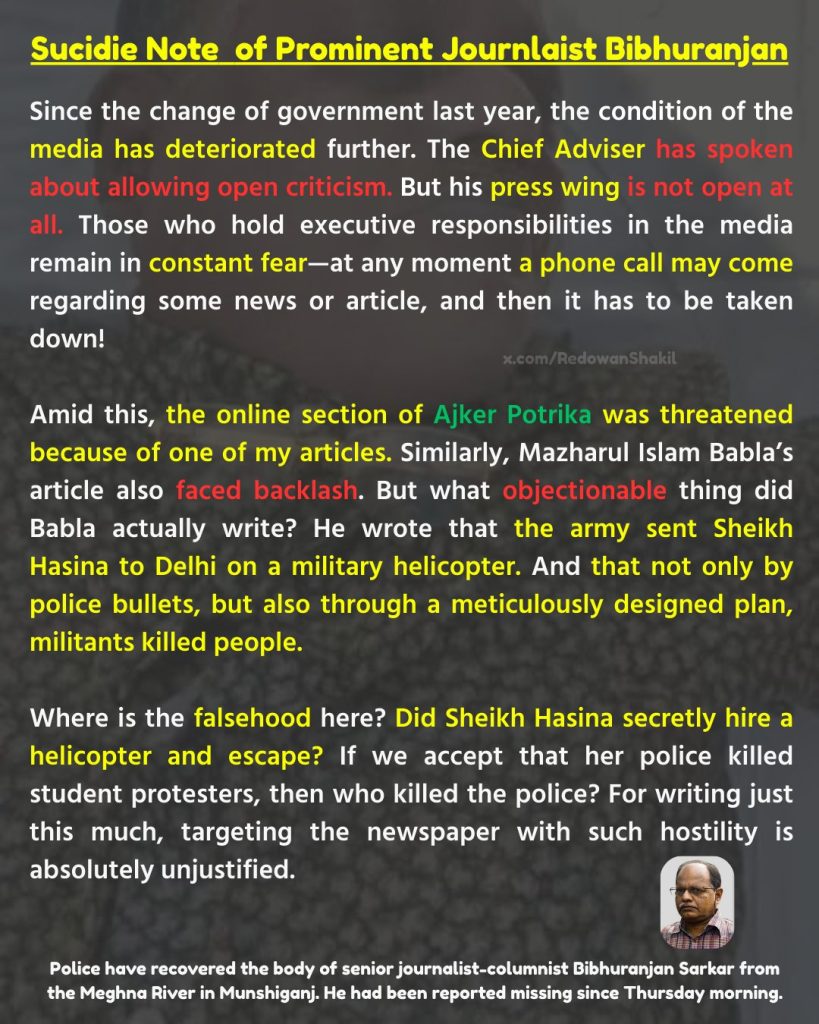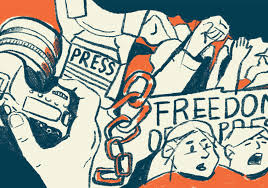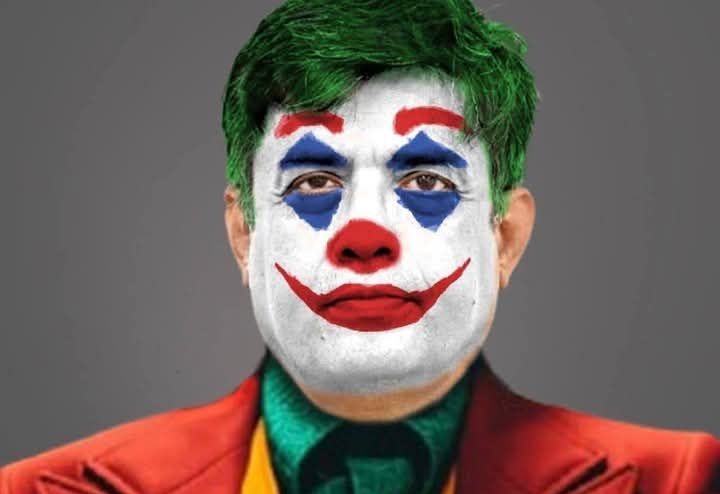Senior journalist, columnist, author and freedom fighter Bibhuranjan Sarker was found dead floating in the Meghna River in Munshiganj on Friday afternoon, a day after he went missing while going to his office at Ajker Patrika as usual.
Born in 1954, Bibhuranjan began his career as a journalist in the late 1960s while still in school, working as a correspondent for the Dainik Azad.
As a student, Bibhuranjan was an active member of the Bangladesh Students’ Union, later serving as assistant general secretary of its central committee. He was also a member of the Communist Party of Bangladesh, but was not active in politics due to his journalism.
He later studied in Bangla at Dhaka University. He worked with some national dailies and weeklies, serving as editor of daily Matribhumi and weekly Chaltipatra, as well as executive editor of weekly Mridubhashon. He also worked for the Weekly Ekota and the daily Rupali.
During the anti-Ershad movement of the 1980s, his political columns written under the pseudonym “Tarik Ibrahim” in the weekly Jai Jai Din gained popularity. He was working as an Assistant Editor at that time.

Among his published books are Brittabandi Rajniti, Dosharoper Rajniti, Awami League Niye Asha O Ashanka, Nana Chinta Nana Mot, and Kar Cheye Ke Bhalo.
He also edited literary works, including Kibria Smarakgrantha Baktrita, Krishak Neta Hatem Ali Khan, and Monaem Sarker Jokhon Nirbasone.
Razakar Azam’s son threatens journalist Panna, Anandabazar for revealing ISI operations
88 expat Bangladeshis condemn persecution of journalists
Meticulous design: Mahfuj Alam reveals July conspiracy, defends mobs
Bibhuranjan’s final article, titled “Khola Chithi”, or Open Letter, was published in the opinion section of bdnews24.com on Friday, where he said it was his last op-ed. He emailed it around 9am before leaving for the office in Banasree without his phone.

In his long letter, the senior journalist wrote about the sorry state of press freedom, being tagged as a collaborator of the Awami League despite not getting any benefit in the last 16 years, financial crisis and discrimination faced by ethical journalists, no promotion or increment for four years, no royalty payment by Agami Prakashani for his two books, rejection of op-eds in different dailies, about his own and his son’s illnesses, his daughter “failing” a higher-level exam as a government officer despite medical leave, and his son’s “difficulty” finding a job after graduating from BUET.
Press freedom in Bangladesh: A hell for journalists
Journalist Bibhuranjan’s open letter before death reveals the suffocating fear inside Bangladesh’s news industry.
“In the media, those who hold executive responsibility live in constant fear. Any time, a phone call may come demanding the withdrawal of a report or article. One of my writings led to threats against the online section of Ajker Patrika. Similarly, Mazharul Islam Babla’s piece also faced harassment. But what did Babla write that was so offensive? He wrote that the army sent Sheikh Hasina to Delhi in a military helicopter. And that not only police shootings, but meticulously designed militant attacks also killed people. Where is the falsehood here? Did Hasina secretly hire a helicopter to flee? If the police killed students, then who killed the police? For such a simple article, it is utterly unjust to target the newspaper.

“Altogether, my situation at the paper has become extremely fragile. The gentle acting editor, unable to bear the pressure, has even stopped speaking to me. What do I do now? Which path do I take?”
Freelance journalist Masood Kamal echoed his view. He had talks with Bibhuranjan at least twice in August when he sought op-eds for the Ajker Patrika. In a video on Friday, Masood Kamal also said he was not surprised after his op-ed for the August 15 edition did not show up in the print version.
The people of the country have witnessed unprecedented incidents of mob attacks, looting, and arson at media offices in an organised way since last August. At least 11 journalists were killed and over 500 were injured in targeted attacks in the past year.
Since the first hours, over 1,000 journalists across the country, including in Dhaka, have been dismissed from their jobs, and editors of eight newspapers and news chiefs of 11 private television channels have been removed so far.
The membership of hundreds of journalists has been suspended, cancelled, or expelled from press clubs across the country.
Then, for the first time in the country’s history, the regime revoked 168 press accreditation cards, barring their access to key installations like the Secretariat. Then it issued temporary cards to new journalists.
In the first 11 months, at least 412 journalists have been implicated in criminal cases, including 266 for murder, and under the repressive Cyber Security Ordinance. Currently, 39 journalists are behind bars.